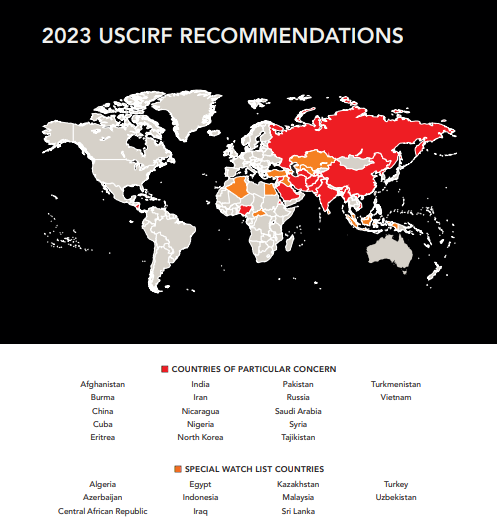International Relations
International Religious Freedom Report 2023
- 06 May 2023
- 5 min read
For Prelims: USCIRF, International Religious Freedom Report 2023
For Mains: Effect of Policies & Politics of Countries on India's Interests, Religious Freedom in India and Relation Issues
Why in News?
The government of India rejected the recommendations of the US Commission on International Religious Freedom’s (USCIRF) 2023 report, calling it biased and motivated.
What is USCIRF?
- USCIRF is an independent, bipartisan US federal government commission, dedicated to defending the universal right to freedom of religion or belief abroad.
- It is an advisory body to the US Congress.
- It is Headquartered in Washington DC.
- Established by the US government after the inaction of the International Religious Freedom Act (IRFA), 1998 the recommendations of USCIRF are non-binding on the state department. IRFA provides that US policy includes condemning violations of religious freedom and assisting other governments in the promotion of this right.
- Traditionally, India does not recognize the view of USCIRF.
What are the Concerns Raised About India?
- Concerns About Certain Laws and Policies: The report highlights concern regarding certain laws and policies in the country that have been criticized for their potential to discriminate on the basis of religion.
- These include laws related to conversion, interfaith relationships, hijab, and cow slaughter, as well as the Citizenship (Amendment) Act, 2019 and the National Register of Citizens (NRC) All of these, it alleges, have not impacted minorities in a favorable way.
- Measures Affecting Freedom of Expression: It raises concerns about alleged measures that may have impacted critical voices, particularly those belonging to religious minorities.
- These include surveillance, harassment, property demolition, and detention under the Unlawful Activities Prevention Act (UAPA), 1967. Some Non-Governmental organizations (NGOs) have also been subject to scrutiny under the Foreign Contribution Regulation Act (FCRA), 2010.
- India as a CPC: It has criticized the US State Department for not having designated India as a Countries of Particular Concern (CPC) and has called for sanctions on Indian government agencies and officials.
- USCIRF has been recommending India's designation as a country of particular concern since 2020 but it hasn't been accepted by the US government so far.
What are the Recommendations of the Report?
- For 2023, based on religious freedom conditions in 2022, USCIRF recommends that the State Department:
- Redesignate as CPCs: Burma, China, Cuba, Eritrea, Iran, Nicaragua, North Korea, Pakistan, Russia, Saudi Arabia, Tajikistan, and Turkmenistan;
- Designate as Additional CPCs: Afghanistan, India, Nigeria, Syria, and Vietnam;
- Maintain on the Special Watch List (SWL): Algeria and the Central African Republic (CAR);
- Include on the SWL: Azerbaijan, Egypt, Indonesia, Iraq, Kazakhstan, Malaysia, Sri Lanka, Turkey, and Uzbekistan;
- Redesignate as Entities of Particular Concern (EPCs): Al-Shabaab, Boko Haram, Hay’at Tahrir al-Sham (HTS), the Houthis, Islamic State in the Greater Sahara (ISGS), Islamic State in West Africa Province (ISWAP also referred to as ISIS-West Africa), and Jamaat Nasr al-Islam wal Muslimin (JNIM).
- Redesignate as CPCs: Burma, China, Cuba, Eritrea, Iran, Nicaragua, North Korea, Pakistan, Russia, Saudi Arabia, Tajikistan, and Turkmenistan;
Criteria for Designation of Countries in Different Categories
- CPCs: When the government of the countries engage in or tolerate “systematic, ongoing, and egregious violations” of the right to freedom of religion or belief under IRFA 1998.
- SWL: It is based on the governments’ perpetration or toleration of severe religious freedom violations.
- EPCs: For systematic, ongoing, and egregious religious freedom violations.
What is the State of Freedom of Religion in India?
- Freedom of religion in India is a fundamental right guaranteed by Article 25-28 of the Constitution of India.
- Article 25 (Freedom of conscience and free profession, practice and propagation of religion).
- Article 26 (Freedom to manage religious affairs).
- Article 27 (Freedom as to payment of taxes for promotion of any religion).
- Article 28 (Freedom as to attendance at religious instruction or religious worship in certain educational institutions).
- Further, Article 29 and 30 of the Constitution deal with the protection of interests of minorities.





